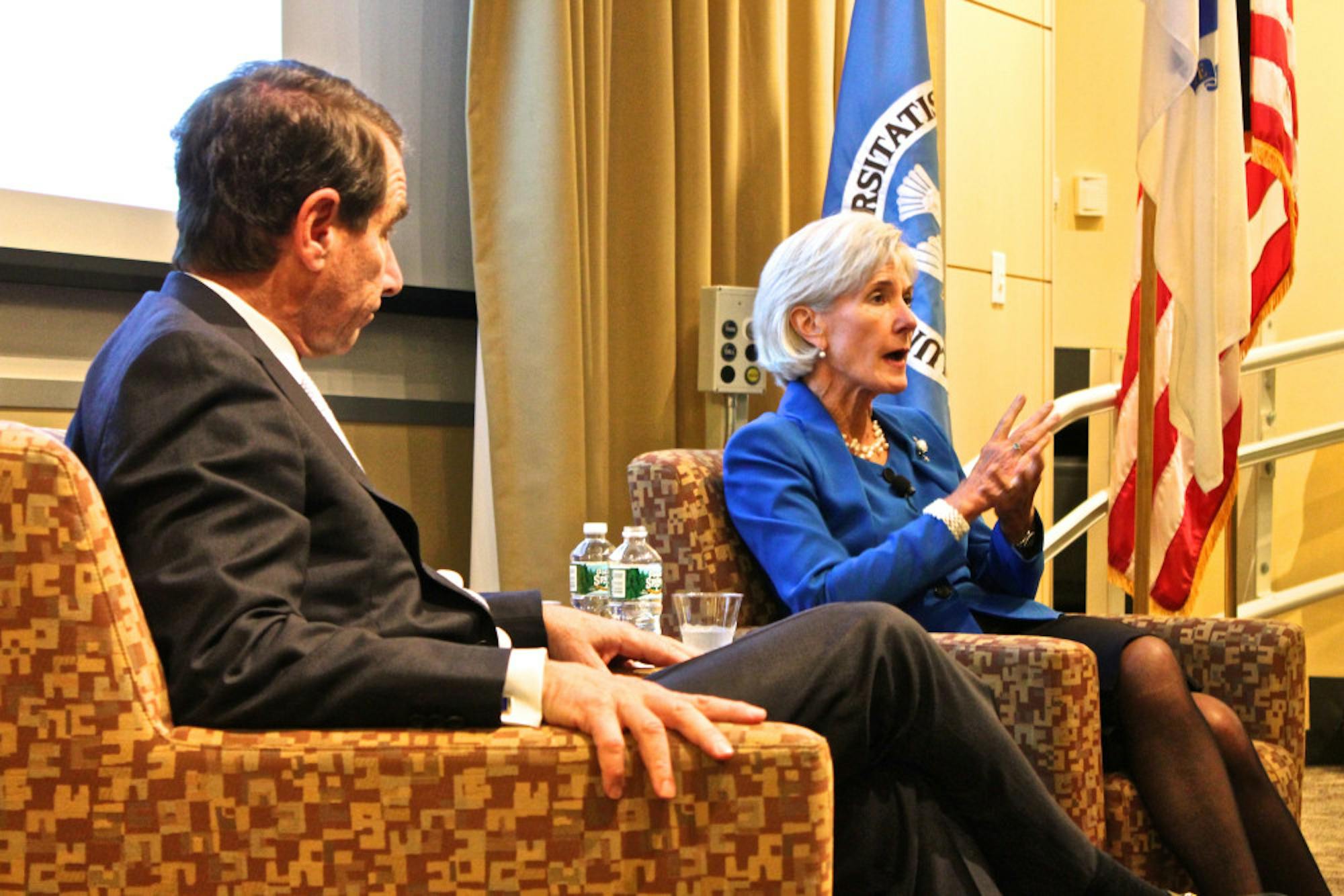Former U.S. Secretary of Health and Human Services (HHS) Kathleen Sebelius spoke about her role in implementing the Affordable Care Act (ACA) in Cabot Auditorium last night as part of the Tisch College Distinguished Speaker Series.
Sebelius answered questions predominantly about the ACA from Alan Solomont (A ’70), the Pierre and Pamela Omidyar dean of the Jonathan M. Tisch College of Citizenship and Public Service, and students. She discussed the behind-the-scenes politics, both in the White House and in Congress, that led to the law passing in 2010 and the subsequent ups and downs of the ACA implementation.
Sebelius, who was at the helm of HHS during the roll-out of the ACA,announced her resignation on Apr. 10 following several problems with the healthcare law's website.
“I figured you needed to own up to the mistake, it was a huge mistake, it was a huge problem,” she said. “So own it, apologize for it, fix it and hopefully move on.”
Several times more people than expected attempted to access the online exchange when it opened last year on Oct. 1. Sebelius said she had initially assumed a “logjam” caused problems with the website. Thirty-six hours later, when issues persisted, she said it was evident “we had much more serious problems than anybody ever knew.”
“It was terrifying,” Sebelius said. “The notion that we might have to go to the president and say we might have to scrap this thing was not good.”
She explained that she set an eight-week deadline to resolve the website problems, but because of the technical problems, the government pushed back the enrollment from Dec. 15, 2013 to Mar. 31, 2014. At this point, more than eight million people had signed up for health insurance through the exchange.
When Sebelius stepped down from HHS secretary on Jun. 9, Sylvia Burwell, the former director of the White House Office of Management and Budget, assumed the cabinet position.
While she did not talk about what she has done since leaving public office, Sebelius quipped,“I’ll take a website any day” over handling the Centers for Disease Control and Prevention's (CDC) response to the recent Ebola outbreak in West Africa. The CDCis one of 11 government agencies for which HHS is responsible.
Sebelius assumed office in 2009, when a pandemic of swine flu H1N1 was killing predominantly young people across the United States. Drawing parallels between the reactions to H1N1 and Ebola, Sebelius said fear has too often guided regulation, citing an idea from 2009 -- which was later shot down -- to close all schools.
“Being guided by science, I think, is hugely important and very, very hard in a situation like this because people are afraid,” she said, referencing the Ebola outbreak. “It’s very dangerous when politicians begin promulgating guidelines not based on science, which is what’s happening now -- because the thing that is so important about this disease is it has to be stopped in West Africa, and if it’s not stopped in West Africa then we’re all in trouble in a really big way.”
Amid debate about how the CDC has responded to Ebola, both in the United States and Africa, Sebelius criticized the “overly confident” rhetoric that the organization has used in discussing the virus.
“The worry shouldn’t be what’s happening here because we are prepared to contain and control and have the best medical personnel to deal with it,” she said. “It’s how we’re actually going to try to contain it in [West Africa].”
National political columnist Matt Bai (LA '90) for Yahoo! News and Boston Mayor Marty Walsh are also scheduled to give talks at Tufts later this semester as part of the Tisch College Distinguished Speaker Series. Their appearances follow the first lecture of the series last month, which featured Sen. Elizabeth Warren (D-Mass.).
Former HHS Secretary discusses Obamacare, Ebola

Kathleen Sebelius, former U.S. Secretary of Health and Human Services is interviewed about her experience as one of America’s leading experts on health policy, health care reform and human service delivery.





